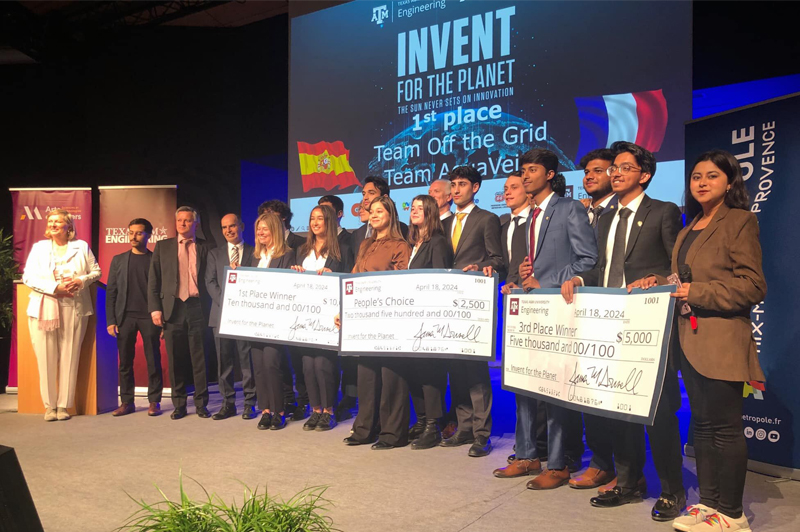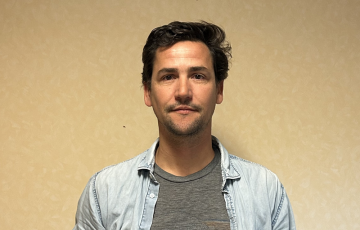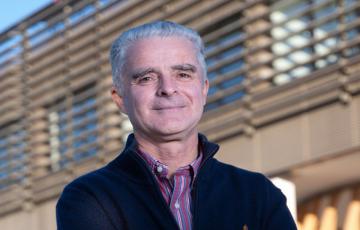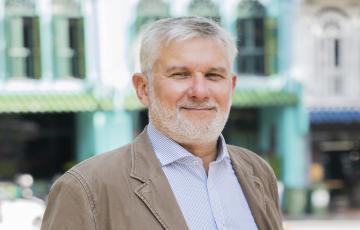Final of the “Invent for the Planet” International Hackathon in Aix-en-Provence

A competition organized by Texas A&M University in partnership with the Arts et Métiers campus in Aix-en-Provence
For the first time, Texas A&M University organized the international finals of its renowned “Invent for the Planet” hackathon outside the United States. The event was held in partnership with the Aix-en-Provence campus of the Arts et Métiers engineering and technology university on Thursday April 18, 2024 at the Aix-en-Provence Convention Center. It continued the series of intercultural and technological exchanges between Texas A&M University and the Arts et Metier that began several years ago. In total, 41 engineering students were selected to take part in this unique experience. The final showcased six green, low-tech projects created by students from Greece, Pakistan, Spain, Brazil, Mexico, and France that featured innovative solutions for social and environmental issues. Another competition, “Spring for Impact”, offered local entrepreneurs and engineers the opportunity to present their projects to a jury of potential investors. Together, these two events formed a day dedicated to sustainable innovation.
For the third time, Professor Féthi Ben Ouezdou, the director of the Arts et Métiers campus in Aix-en-Provence, has joined forces with the “Invent for the Planet” hackathon organized by the prestigious Texas A&M University. This international competition, led by Jim Donnell, director of The Meloy Engineering Innovation and Entrepreneurship Program, brought together 38 universities from around the world and over 350 students to design a project that needed to be prototyped in just 48 hours.
The first phase of the event took place from February 16 to 18, 2024 at participating universities in different countries. In March, the juries selected the finalists, who met on Thursday April 18, 2024 in Aix-en-Provence for the final.
The “Invent for the Planet” hackathon is a reflection of the vibrant cross-Atlantic academic collaboration between Arts et Metiers and Texas A&M University that was initiated in 2017. This collaboration is supported by Provence Promotion, which works to forge links between France and the United States through new industrial projects and the cross-fertilization of innovations.
Six teams pitched their projects, with the French team winning two prizes

Spotlight on the six finalists who pitched their projects in the amphitheater of the Aix-en-Provence Convention Center:
- Off the Grid (Spain) presented a low-tech steam sterilizer for medical instruments that runs on solar energy. With a simple design that requires no electricity, this sterilizer is an inexpensive piece of essential medical equipment (production cost estimated at €250). It was developed with African countries in mind, where numerous people die from post-operative infections. With a parabolic structure inclined to concentrate the sun’s rays, water is heated to produce steam that reaches the levels required for effective sterilization.
- Hydrotide (Mexico) presented an acoustic buoy to help prevent the by-catch of non-commercial species of fish. Used by governments and researchers, this buoy, whose waves repel certain kinds of fish, could also be used to protect breeding grounds. The prototype, which would also collect data, was estimated by the students to cost $50,000.
- PureFlow (Pakistan) presented a water tank with a filter system to purify rainwater or wastewater, enabling communities in water-stressed countries to have access to a safe and reliable source of drinking water, thus helping to improve their health and quality of life. Based essentially on gravel and activated carbon, a tank measuring three meters in diameter and one meter high could treat 1200 liters of water a day.
- AquaVein (France) presented another project linked to drinking water, which they tested in Papua New Guinea and Tahiti. Thanks to a clay cone fixed into the trunk of a banana tree, a filter, and a pump system, this solution could recover up to 40 liters of water per week per banana tree without harming the plant.
- Vento Luz (Brazil) presented a wind turbine designed to address the precarious situation of populations without access to electricity. Suitable for home use, it can be installed using a simple manual and has the advantage of being highly affordable.
- Seacare (Greece) presented a project related to marine animal protection that features an NFC system that can be attached to nets to repel specific nomadic species while also collecting data. This innovative device bypasses the problems associated with underwater sound waves and is small and durable.
Two teams tied for the top prize of €10 000 euros: the Spanish team with the Off the Grid project and the French team from Arts & Métiers in Aix-en-Provence with the AquaVein project. France also won the People’s Choice Award. Congratulations to all!


 +33 4 96 11 60 00
+33 4 96 11 60 00







